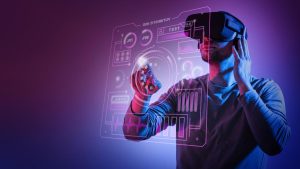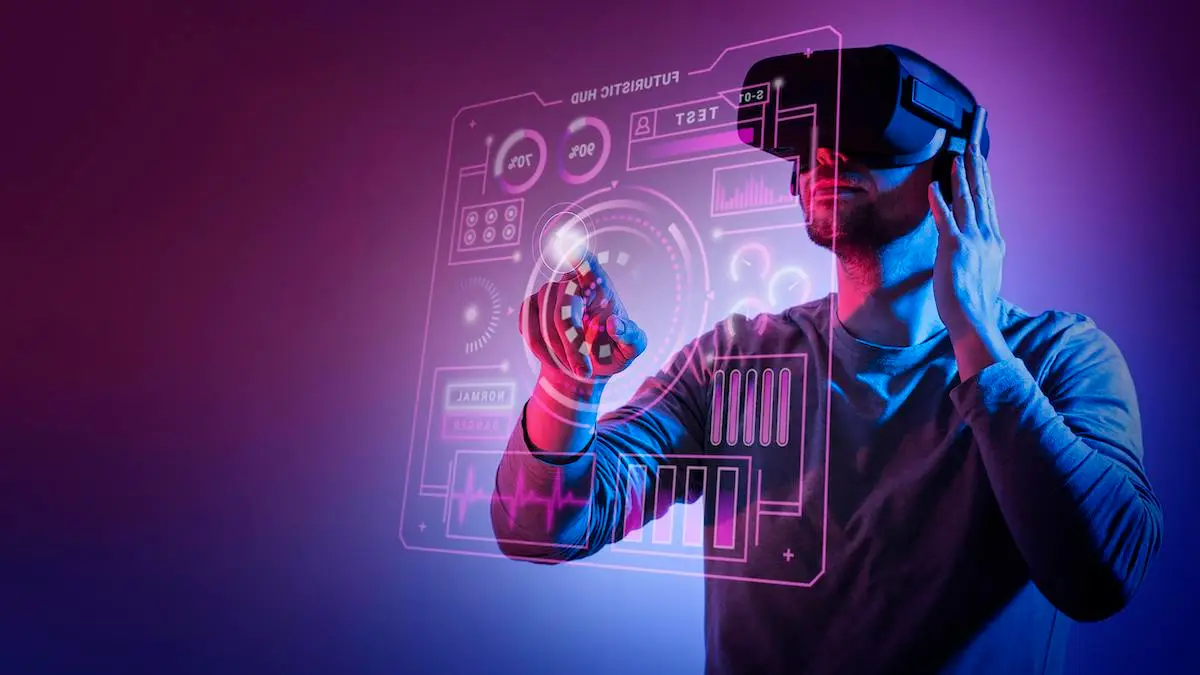Introduction
The Metaverse is one of the most talked-about technological concepts of the 21st century. It refers to a shared, immersive virtual space where people can interact with each other, digital objects, and environments in real time. Unlike traditional internet experiences, the digital world aims to blend virtual reality (VR), augmented reality (AR), blockchain, and artificial intelligence (AI) into a seamless digital ecosystem. Think of it as the next evolution of the internet — a persistent, 3D space where physical and digital realities converge.
What is Metaverse?
Digital world is a virtual universe that integrates augmented reality (AR), virtual reality (VR), artificial intelligence (AI), and blockchain technology to create an immersive digital environment. It is often described as the next evolution of the internet—a space where users can interact with each other and digital assets in real-time, much like they do in the physical world.
Coined by Neal Stephenson in his 1992 sci-fi novel Snow Crash, the term digital world refers to a digital realm where people can live, work, socialize, and trade. Today, it has become a reality with major tech giants like Meta (formerly Facebook), Microsoft, and Google investing billions into its development.
Over the past decade, the Digital world has transitioned from a futuristic concept to an evolving digital landscape. Companies are utilizing the Metaverse for virtual meetings, remote workspaces, product demonstrations, and even AI-powered customer service.

The COVID-19 pandemic accelerated digital transformation, making virtual experiences an essential part of work, education, and social life. As a result, the digital world has gained momentum like never before.
Thedigital world is still in its early stages, but the future holds endless possibilities. The digital world is not just a trend—it is the next frontier of digital interaction, transforming how we connect, work, and experience life. As technology continues to evolve, the possibilities for this digital universe are limitless. Whether it’s social networking, business innovation, or entertainment, the Metaverse is poised to redefine our reality.
Key Technologies Behind the Digital World
-
Virtual Reality (VR): Headsets like Oculus Quest and HTC Vive allow users to step into fully immersive 3D environments.
-
Augmented Reality (AR): Tools like Microsoft HoloLens blend digital objects with the physical world.
-
Blockchain & NFTs: Digital ownership is powered by blockchain technology, allowing users to buy, sell, and trade virtual goods and NFTs (Non-Fungible Tokens).
-
Artificial Intelligence (AI): AI powers realistic avatars, speech recognition, and content creation in the digital world.
-
5G & Cloud Computing: Fast networks and cloud servers make seamless, real-time interactions possible.
Applications of the Metaverse
The Metaverse is not just about gaming — its applications span across industries:
-
Entertainment & Gaming: Platforms like Roblox and Fortnite already allow millions to socialize, play, and even attend concerts virtually.
-
Education & Training: Virtual classrooms and simulations make learning more interactive and accessible worldwide.
-
Healthcare: Surgeons can practice in virtual environments, and therapy sessions can take place in calming digital spaces.
-
Business & Work: Virtual offices and meetings reduce the need for physical presence, enabling global collaboration.
-
Real Estate & E-commerce: Users can tour virtual properties or try on clothes in a digital fitting room before buying.
Benefits of the Metaverse
-
Global Connectivity: Connect with anyone across the world in real time.
-
New Economic Opportunities: Digital assets, virtual real estate, and NFTs create new markets.
-
Enhanced Learning & Creativity: Immersive tools encourage innovation and education.
Challenges of the Metaverse
Despite its potential, the Metaverse faces hurdles:
-
Privacy & Security: Managing personal data and digital identity is critical.
-
Digital Divide: Not everyone can afford VR headsets or fast internet.
-
Regulation & Governance: Questions remain about ownership, taxation, and law enforcement in virtual worlds.
-
Addiction & Mental Health: Overuse of immersive technologies may affect well-being.
Future of the Metaverse
The Metaverse is still in its early stages, but it has the potential to transform how we work, learn, shop, and socialize. Experts predict that within the next decade, the digital world could become as essential as the internet itself — hosting digital economies, virtual cities, and new forms of social interaction.
Conclusion
The Metaverse represents a digital revolution that combines VR, AR, AI, and blockchain into a shared universe. While challenges remain, its applications in education, healthcare, entertainment, and business show that the future is already unfolding. Whether it becomes a fully realized parallel world or remains a collection of immersive platforms, the Digital world is shaping the next chapter of our digital lives.
Explore more blogs – click here
Visit LinkedIn page – click here

